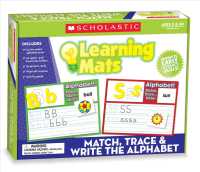Full Description
Assessment innovation tied to technology is greatly needed in a wide variety of assessment applications. This book adopts an interdisciplinary perspective to learn from advances in developing technology enhanced innovative assessments from multiple fields. The book chapters address the development of virtual assessments including game-based assessment, simulation-based assessment, and narrative based assessment as well as how simulation and game based assessments serve both formative and summative purposes. Further, chapters address the critical challenge of integrating assessment directly into the learning process so that teacher effectiveness and student learning can be enhanced. Two chapters specifically address the psychometric challenges related to innovative items. One chapter talks about evaluating the psychometric properties of innovative items while the other chapter presents a new psychometric model for calibrating innovative items embedded in multiple contexts. In addition, validity issues are addressed related to technology enhanced innovative assessment.
It is hoped that the book provides readers with rich and useful information about the development of several types of virtual assessments from multiple perspectives. The authors include experts from industry where innovative items have been used for many years and experts from research institutes and universities who have done pioneering work related to developing innovative items with formative applications to facilitate learning. In addition, expert advice has been provided on validating such work.
Contents
Chapter 1. The Virtual World and Reality of Testing: Building Virtual Assessments; Christopher Agard and Alina von Davier.
Chapter 2. Consistency and Validity in Game-Based Stealth Assessment; Valerie J. Shute and Gregory R. Moore.
Chapter 3. Designing, Implementing, and Researching the Effects of Narrative-Based Assessment in Virtual Environments; Diane Jass Ketelhut and Brian C. Nelson.
Chapter 4. SimScientists: Affordances of Science Simulations for Formative and Summative Assessment; Edys S. Quellmalz and Matt D. Silbertglitt.
Chapter 5. Exploring the Psychometric Properties of Innovative Items in Computerized Adaptive Testing; Hong Qian, Ada Woo, and Doyoung Kim.
Chapter 6. A New Noncompensatory Testlet Model for Calibrating Innovative Items Embedded in Multiple Contexts; Hong Jiao, Robert Lissitz, and Peida Zhan.
Chapter 7. Validity Issues for Technology-Enhanced Innovative Assessments; Brian Clauser, Melissa J. Margolis, and Jerome C. Clauser.
Chapter 8. Principled Design and Development for Embedding Assessment for Learning in Games and Simulations; Kristen DiCerbo, Steve Ferrara, and Emily Lai.
Chapter 9. Innovations in K-12 Assessment: A Review of CBAL Research; Randy Elliot Bennett, Rebecca Zwick, and Peter van Rijn.
Chapter 10. ICT Literacy as a 21st Century Skill: Learning in Digital Networks; Mark Wilson, Kathleen Scalise, and Perman Gochyyev.
Chapter 11. Visualizing the Process of Change in Learner Beliefs; Valerie J. Shute, Allen C. Jeong, and Diego Zapata-Rivera.
About the Authors.








